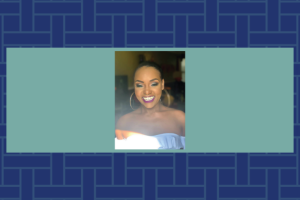
Ballet After Dark, a member of the Social Innovation Lab’s 2021-22 cohort, was founded by Tyde-Courtney Edwards.
SIL: Tell us about your company. What are you working on?
Tyde-Courtney Edwards: Ballet After Dark provides the only somatic intervention program that uses a trauma-informed dance therapy curriculum and holistic resources to encourage survivors of sexual violence and various levels of trauma to heal their bodies using movement. With an emphasis on amplifying and prioritizing the healing of Black and brown youth and women, our mission is to help survivors reprocess, rebuild and reclaim relationships with their bodies following sexual abuse and trauma using the healing power of dance.
What I am working on in the Social Innovation Lab is the process of launching BAD Studios, an interactive, subscription-based database of trauma-informed, holistic dance therapy tutorials and videos for customers interested in a fun, gentle, and low-impact series of dance therapy classes and workshops that culminate in choreographic sequences no matter their level of dance experience. With a focus on highlighting the expertise and talent of local dance creatives from the BIPOC community, BAD Studios uses the healing power of dance to empower all bodies to get moving.
Facilitated by local somatic providers, certified dance therapists, and dance creatives, this warm and welcoming library of live streams and recorded content engages dance enthusiasts of all levels, sizes, and abilities with a variety of dance therapy and fitness tutorials, including ballet, tap, jazz, hip hop, yoga, heels, African, burlesque and mindfulness.
SIL: Why did you decide to start Ballet After Dark?
In a world of no, you create a yes. Trauma can affect us physically, change our behavior and leave us feeling disconnected from our bodies. Surviving assault left me searching for new ways to love myself and my body again. Not only was I trying to mend the broken relationship I had with my body, I was searching for a support system of women with similar experiences that looked like me.
Ballet After Dark, then, was born out of necessity. The possibility of meeting and associating with other women is essential for the advancement of human rights. Sisterhood and community is rooted in the history of Black culture. Through the creation of safe spaces, women can speak about their experiences and realize they are not alone. Black women especially are able to experience healing in a space free of oppression from both racial and gender lenses.
SIL: What have you accomplished so far?
Since 2018, more than 220 individuals, of which 70% are Black and brown in Baltimore City, have taken part in the Ballet After Dark dance therapy cohort. It’s a nine-month commitment broken into three quarters and focuses on 12 class workshops centered around dance, including ballet and burlesque. We have an 85% graduation success rate for participants completing our entire curriculum, which in addition to the dance therapy, includes units on mental health, financial literacy and self-defense. We have had women who have reported a better sense of self, security, well-being and connection with body/kinesiology and how the body moves.
We’ve been featured by local, national and international media. Currently, our short film is streaming on discovery+.
SIL: How can people get involved in supporting you in your venture?
Volunteers! We’re always looking for fantastic community members to volunteer with our program to assist with events, boost visibility, and volunteer for dance training as interns. We’re also looking for donations in the form of event space and program sponsors. Donations can be made by visiting www.balletafterdark.com/donate.
Program Sponsors! We’re always looking for program sponsors to support our efforts of spreading awareness of the benefits of dance therapy and somatic intervention by sponsoring program supplies and equipment such as cohort uniforms, transportation stipends and workbook curriculums.
Funding! We are looking for funding for a few initiatives, including:
- launching and scaling our youth program;
- launching a professional development program to dancers (we will offer PD to dance instructors who want to integrate trauma-informed practices into their curriculum);
- Platform and content development for BAD Studios.
SIL: What do you like most about the Baltimore entrepreneurial community? What would you like to see more of?
I like that Baltimore is an unexpected hub. Baltimore is recognized for a lot of things that don’t necessarily spark joy or innovation. I love that SIL provides an opportunity to be connected with people you didn’t realize were doing such great things.
As for the ecosystem, I would love to see more professional opportunities become available for BIPOC dance entrepreneurs and innovators and train them to pivot if their professional career doesn’t work out the way they had intended. One of the biggest challenges that dancers face is they are trained to find employment but then go elsewhere to find opportunities. Not everyone will make it to the stage. Some people will prepare for 10–15 years and teach, and some may not ever become a teacher.
I’d love to see more transitional training for professional dance creatives who are now looking for work. More professional development and performance opportunities reflecting the diversity of the dance scene in Baltimore.
SIL: What advice do you have for would-be social entrepreneurs thinking about starting a venture?
You’re smarter than you think and you’re stronger than you know. Take a chance on yourself.
SIL: Why did you apply to SIL?
For the opportunity to develop skills and resources to scale my venture and be part of a network of like-minded individuals who understand the struggle of developing that has a social impact or cultivating change in community.
Read more about Ballet After Dark here. To learn more about the Social Innovation Lab and the 2020–22 cohort, click here. Join them at the SIL Innovators’ Showcase event, 4–6 p.m. on April 26.